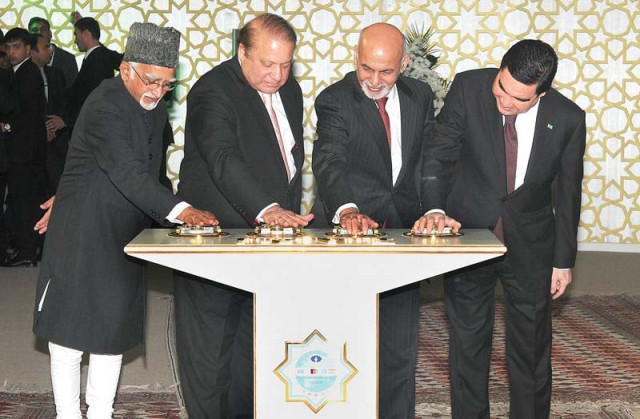PM joins regional leaders to break ground on ‘trailblazing project’
Nawaz says presence of regional leaders at the ceremony signals the importance they attach to the project

Leaders from Pakistan, Afghanistan and India, along with Turkmenistan’s president attend the groundbreaking ceremony of the TAPI gas pipeline in Mary. PHOTO: AFP
The ground-breaking ceremony of what Premier Nawaz billed as a ‘trailblazing project’ was held near Mary, the fourth largest and industrial city of the Central Asian state.
Prime Minister Nawaz Sharif was joined by Afghan President Ashraf Ghani, Turkmen President Gurbanguly Berdimohamedow and Indian Vice President Muhammad Hamid Ansari at the ceremony where they pressed the button to launch work on the 1814-kilometre-long pipeline.
The four leaders also affixed their signatures on the pipeline to record the historical moment. The project, which is expected to be completed by 2019, will supply Pakistan 1325 mmcfd of natural gas to help mitigate its chronic energy crisis.
Addressing the ceremony, Premier Nawaz said the presence of regional

leaders at the ground-breaking ceremony clearly signalled the importance they attached to this ‘game changing project’ and their commitment to its early completion. “It is a momentous day that an achievement has been made through perseverance, patience and collective endeavours of all stakeholders,” he said.
He also thanked the Turkmen president without whose involvement and keen interest the project could not have seen rapid progress. He also congratulated the Indian and Afghan leaders for their commitment to making the gas pipeline a success.
“Tapi is not just a gas transit initiative connecting energy-rich Central Asia with energy-starved South Asia but a trailblazing project,” he said, adding that it would open up door to regional economic progress and integration.
The prime minister said the flagship project would usher in a new era of transformation for millions of people making Tapi a symbol of shared prosperity and socio-economic development.
He said Tapi was of great significance for Pakistan’s energy outlook, besides being a vital component of his government’s efforts to mitigate the country’s energy crisis through import of natural gas and electricity. He added that his government was also working on additional power projects as work on CASA-1000 was being carried out expeditiously.
“Regional connectivity subject is close to my heart. It is through projects like TAPI that we can join hands for pursuing a common goal of strengthening of peace and prosperity in our region.”
Referring to the China-Pakistan Economic Corridor (CPEC), the prime minister said the most promising element of regional connectivity was recently launched as a package of multiple infrastructure and development projects. Pakistan also encourages other countries in the region to take advantage of this project that will provide the shortest route through its seaports to Central Asia.
On the occasion, the presidents of Turkmenistan, Afghanistan and the vice president of India also spoke and said it would create a win-win situation for the component countries by opening new vistas of economic opportunities.
Starting from Turkmenistan’s Galkynys gas field, the pipeline will pass along Kandahar-Herat Highway, and moving through Pakistan, it will culminate at the Indian town of Fazilka, near the Pak-Indian border. It will benefit around 1.5 billion people in the area, and the ‘blue fuel’ as it is known in the Turkmen’s local dialect will continue flowing by 33 billion cusec meters per annum.
A memorandum of understanding for supply of power from Turkmenistan to Afghanistan and Pakistan was also signed by the three countries’ leaders.
Earlier, at Mary city airport the Turkmen president received Prime Minister Nawaz Sharif. The four leaders also had a brief meeting where they discussed matters of mutual interest.
Published in The Express Tribune, December 14th, 2015.



















COMMENTS
Comments are moderated and generally will be posted if they are on-topic and not abusive.
For more information, please see our Comments FAQ